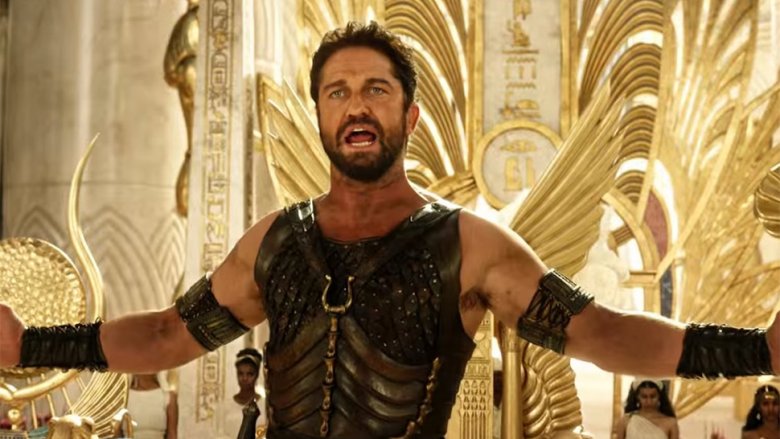Gerard Butler Thinks Gods Of Egypt Whitewashing Controversy Was Unfair
Gerard Butler says he "got the point" of widespread criticism to the predominately-white casting of his 2016 movie Gods of Egypt—but says that he fundamentally disagrees with charges his movie in particular was problematic, saying that if he had a second chance, he'd take the role again.
The actor shared his thoughts in an interview with Yahoo! Movies conducted to promote his new disaster film Geostorm, discussing the diversity of the Geostorm cast and lamenting that critics of Gods of Egypt didn't notice the diversity on display in that movie. Observe:
"One of the main points of [Geostorm] was diverse attitudes," Butler said. "It's an international delegation of scientists. It's all governments from all different walks of the world, but it's everybody learning to think on the same level when it comes to higher values or bigger challenges."
Interviewer Hanna Flint took the opening in the conversation to ask Butler if, in light of Ed Skrein leaving behind his cozy Japanese-American Hellboy role earlier this year due to the whitewashing implications, he would do the same for his role in Gods of Egypt were he to be offered the part again.
"No," Butler responded, "Because I think that was... I understand the movement generally, but you consider our movie, also one of our leads was based on an Egyptian god who is not black." Presumably Butler is talking about Bryan Brown's character of Osiris, who is typically portrayed as—uh—green.
"We had Ethiopians, we had Egyptians, we had all different actors from all over the place," Butler said. "It was never really... They were from everywhere. So I thought that was a little too much to try and damage a movie like that. I don't know. I disagree, but I got the point."
As a reminder, Butler in Gods of Egypt played Set, usurper god of the desert, who for several thousand years has been commonly drawn to look like this. Which—okay. Set is not a real person and never has been—but if he was, he certainly doesn't look very Scottish. He looks more... kind of Egyptian, weirdly.
Now, Butler certainly doesn't deserve blame for being a working guy swept up in cultural forces that have always been much bigger than a single person could ever be. And in the interview clip, he genuinely seems like he's trying to grapple with the implications of the topic in a way that makes sense for him. He doesn't deserve a beating for not giving the "right answer" to the question, though when compared with the uniform praise Skrein received after departing his role in Hellboy, it's easy to paint him as being out-of-touch.
Korean-American actor Daniel Dae Kim later took over the Hellboy role from Skrein, a happy ending for the controversy which will hopefully lead to a steady decrease in these sorts of incidents. Whitewashing is a big problem in the entertainment business—for minority actors, it's the problem, and talking about it openly leads to evolutions in opinions that can benefit the entire industry.
Also worth noting is that audiences were unkind to Gods of Egypt for a variety of reasons, with whitewashing probably being relatively low on the list of grievances for general audiences—but the situation was still controversial enough that the makers of the film, including director Alex Proyas and studio Lionsgate, issued prompt apologies about the casting before the movie had even been released.
We've reached a point where the question of where to place the blame for whitewashing in cinema almost doesn't matter compared to the fact that audiences are increasingly voicing their displeasure with it. Gone are the days when you could put Peter Sellers in a ridiculous costume and call him Chinese, and in a small but significant way, the world is better for it. The world is still getting better now—it's uncomfortable to talk about, but that's how progress happens.
Regardless, we would likely all agree that the real losers here are everyone out there still hoping for a Gods of Egypt 2.
